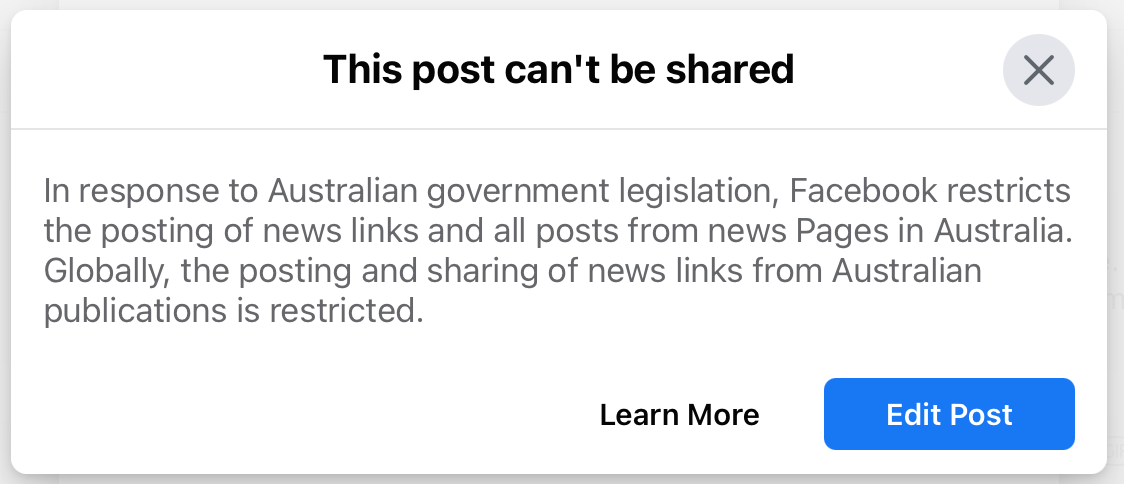No news is... a sign of a stagnating Internet
Thursday, 18 February 2021
Today, Facebook shut off the news in Australia – all of it, and much more besides. For example, when I tried to post a link to this blog entry on Facebook, they responded:

Reactions in Australia have varied from furious to bemused to begging them to turn it back on. No doubt competition regulators will take this as further evidence that big platforms need to be put in their place – and it seems like there’s near universal agreement on the destination, but not on how to get there.
Of course, Facebook didn’t really stop Australians from getting news – they can still go to the ABC’s Web site, use the BBC’s apps, and so on. However, to many people (including advertisers and publishers), Facebook and Google are the Internet, and this is evidence of a much deeper problem than a company exposing how badly it judged the situation.
The problem is that no matter what you think of the proposed News Bargaining Code, Facebook’s actions this week are a dramatic demonstration of a failure of the Internet to evolve, and a failure to meet its design goals.
The Internet is architected to avoid choke points where a single party can control people’s experience of it. So is the Web, at a high level: no single Web browser has enough market share to control it (although we get worrisomely close sometimes). Not only is this avoidance of control points embedded in the architecture, it’s also embodied in how we think about the Internet.
So, when near-monopoly ISPs in the US demanded extra payments from popular content providers, the Network Neutrality debate was born. As a single source of naming, DNS is a natural choke point, but it’s purposefully designed to spread responsibility across multiple parties, so that a rogue root server can’t take my site offline. I can change email providers relatively painlessly (as long as I have the foresight to use my own domain name). If my Web browser started acting against my interests, I can switch to another one, and expect sites to keep working.
Each of these areas is fragile and requires vigilant oversight, and the Internet community has become proficient at rebuilding and improving existing infrastructure in place to avoid formation of these choke points, and fighting them when they emerge. However, we have completely failed to build new, shared value on top of that infrastructure: the high water mark was the Web browser, and almost all innovation above that level has been driven by private companies, often at large platforms (either natively or through acquisition). That’s led to the formation of choke points in the emerging infrastructure of the Internet - the stuff that’s build on the original foundations that is now itself becoming foundational.
For example, there wasn’t any open, standards-based way to do social networking, so Facebook grabbed the space and collected all of the associated network effects to themselves. Facebook had no imperative to interoperate with others, and they bought a fair chunk of the potential competition. As a result, they are effectively a choke point for many Internet users (including news sites, which is how we got here). It’s a platform, but not an open one.
Likewise for search advertising, and ecommerce, and many other online things that people’s lives revolve around directly or indirectly. For most people, the Internet flows through Google, Facebook, Amazon and a few others – all higher-layer chokepoints. Not quite monopolies, but stunning concentrations of power and wealth, and worrisome capabilities to control society, as Facebook has demonstrated today.
The open, community-based Internet has well-understood properties that haven’t been carried through to many of the applications that are closest to end users, even though they mediate the Internet for most people. Disturbingly, many of these companies use the openness of the Internet as a cloak to fend of any questioning of their legitimacy – claiming that because they are the Internet to so many, they inherit its property of openness through some kind of ethical osmosis.
There are numerous reasons for this failure. We still haven’t cracked the identity problem. Building truly decentralised application protocols is hard. Companies like Facebook have every incentive to keep generated value for themselves, and the Web platform arguably encourages them to do so (the Extensible Web Manifesto deserves a rethink in this light). Standards are slow to respond to user needs, and often aren’t well-suited for the market’s needs (Moxie talks about this in detail). Facebook has a strong incentive to innovate in order to capture and keep it, while distributed and federated solutions have different, and often weaker, incentives (consider the pace of innovation in e-mail clients, GMail notwithstanding). Social networking is just one market; there are many more that are just as problematic.
However, that doesn’t mean it’s impossible. Facebook itself (along with Instagram for counterpoint) demonstrates what features a social network might need; we don’t need to design an open replacement from scratch. Open standards for social networking already exist; they may not be perfect, but are likely a reasonable starting point.
Most importantly, one of the main remedies that competition authorities around the world are looking at is requiring dominant undertakings like Facebook to expose interoperable interfaces, so that people aren’t trapped into one company’s product by network effects. That could provide the catalyst for a growth of the Internet as designed – if politicians don’t get distracted by dreams of home-grown replacements.
So, as the ACCC, Parliament and many other authorities around the world try to figure out what to do about Facebook and other big platforms, it’s important for them to remember that the Internet itself is not a child of competition alone – it’s much more the product of cooperation on a global scale. By carefully harnessing those mechanisms and using their powers to require dominant undertakings to come to the party, we could kick-start innovation on the Internet that doesn’t place the rewards – or control – into a few privileged hands.
